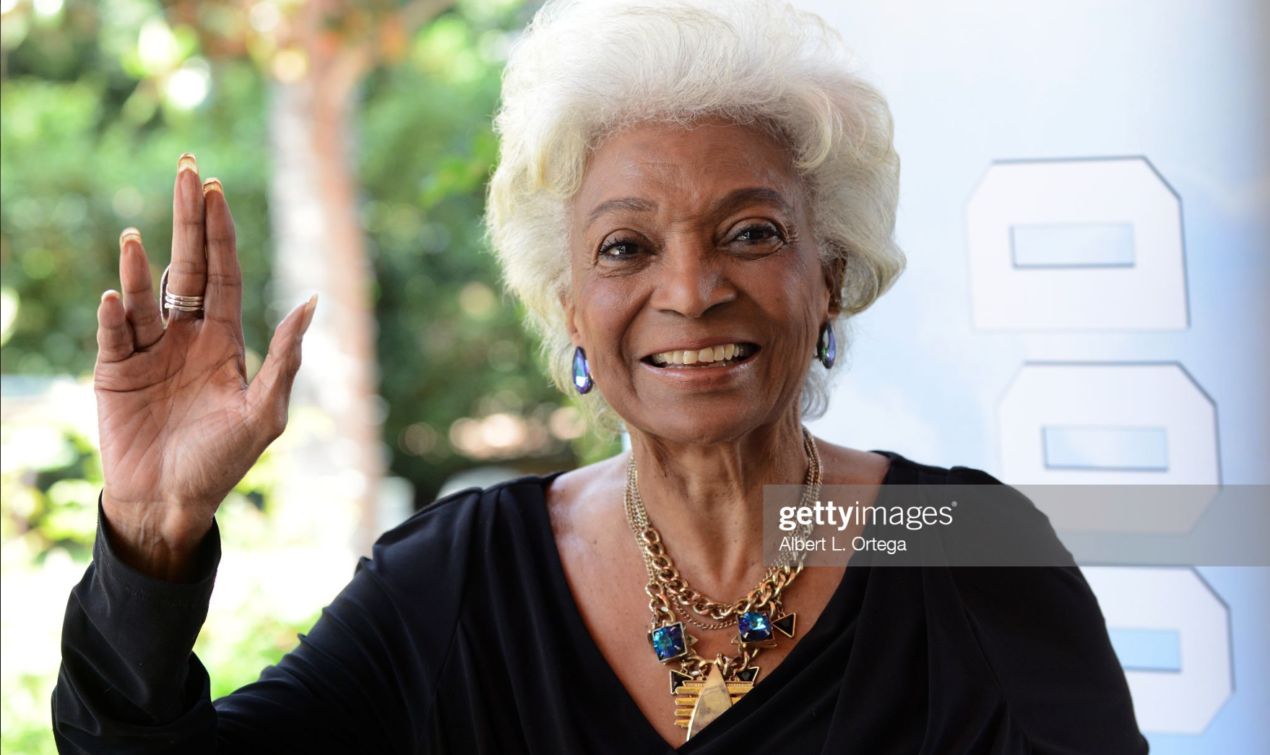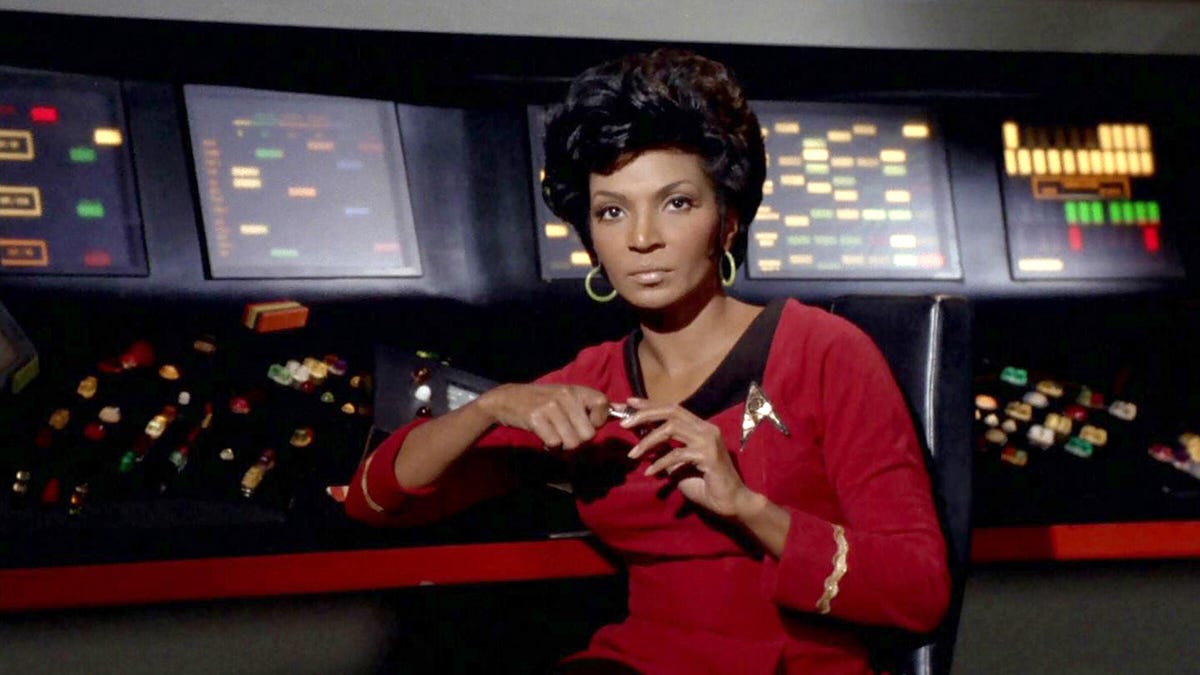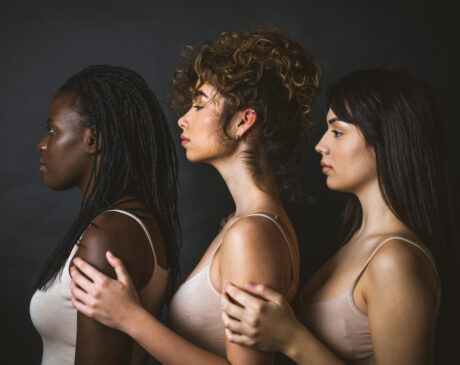In the early days of both film and television, diversity in film and television was not fairly represented. Seeing a Woman of Color in an essential role was anything but the norm. While the occasional Black actor such as the phenomenal Sidney Poitier might get an authoritative position in a 1960s film, the country was riddled with hate and discrimination and it showed on screen. Networks weren’t placing diverse faces on screen and certainly not in positions of power. Creator Gene Roddenberry, wanted to show a vision for the future that surpassed the hate of racial discrimination and gender discrimination in a society that had evolved, and by showing it, he hoped viewers would aspire to such a reality.
For the first time, we are being seen the world over as we should be seen.
Martin Luther King, Jr.
When Nichols took the role of Uhura, she found it overwhelming and struggled due to the fact her character was always minimized in favor of the three lead white male actors. Nichols came close to permanently leaving the series until a meeting with Civil Rights Leader Martin Luther King Jr. According to Nichols, in an NPR interview given in 2011, King told her that, “For the first time, we are being seen the world over as we should be seen,” and that, “this is the only show that my wife Coretta and I will allow our little children to stay up and watch.”
That is when Nichols then understood the power her image had on society and continued with the series and her pioneering performance, including the first interracial kiss seen coast to coast. By the 1970s Star Trek may have ended its exploration of going where no one had been before, though for Nichelle Nichols, it was still just beginning.

Nichols went on to join the board of directors at the National Space Institute when she noticed the lack of diversity in the room. She asked the leadership “Where are my people?” According to NASA Administrator Bill Nelson, “After Apollo 11, Nichelle made it her mission to inspire women and people of color to join this agency, change the face of STEM and explore the cosmos. Nichelle’s mission is NASA’s mission. Today, as we work to send the first woman and first person of color to the Moon under Artemis, NASA is guided by the legacy of Nichelle Nichols.” Nichols may have played a character pretending to be in space, but now she was actually putting others into space who looked more and more like herself. Through the 1970s the project went on to become a monumental success, which saw the rise of many other women of great importance in the space agency, such as Dr. Judith Resnik, who was sadly killed during the Space Shuttle Challenger Mission. Other equally-prominent female astronauts include Lori Garver and Dr. Sally Ride, among countless others. In 2015, Nichols herself would be invited to fly aboard NASA’s Stratospheric Observatory for Infrared Astronomy on an eight-hour high altitude mission via Boeing 747SP.
"I was very blessed in always knowing what I wanted to do."
Nichelle Nichols impact was truly larger than life; Nichols played a pivotal role for the reinforcement of representation of women, not just for the screen and stage, but in the real world. She showed that women are equal to men and that they too can reach for the stars – and not just white women but women of color. As a Trekkie myself, I have seen every iteration of Star Trek that presently exists and I can say with full confidence, the further along the series goes the more progressive the show becomes.
For example, because of Uhura, Star Trek: The Next Generation saw several female actresses in positions of authority, from the ship’s doctor to the ship’s counselor. In the following series, Deep Space Nine, we find not just a female on the bridge, but we see the first Captain of color, Avery Brooks. Through a seven-season run, and a show that often confronted racism and politics in its storylines, Captain Benjamin Sisko is a role model for African Americans and the world to see. But for Lt. Uhura, there would be no Captain Sisko. In 1995, came the series entitled Voyager which depicted the franchise’s first female captain. Captain Kathryn Janeway commands with authority and compassion, breaking away from previous patriarchal tropes that you must be tough only to take command.
Most recently, in Star Trek: Discovery, we have a non-binary, African-American Captain leading a crew nine hundred years into the future. Young women, young people of color and other minorities can see themselves on screen and dream of what they can become as well.
Two roads diverged in a yellow wood, and sorry I could not travel both and be one traveler, long I stood and looked down one as far as I could To where it bent in the undergrowth; then took the other, as just as fair, and having perhaps the better claim, because it was grassy and wanted wear; though as for that the passing there had worn them really about the same
- The truth is rarely pure and never simple.
- Books are a uniquely portable magic.
- It’s no use going back to yesterday, because I was a different person then.
You never really understand a person until you consider things from his point of view… Until you climb inside of his skin and walk around in it. You have to write the book that wants to be written. And if the book will be too difficult for grown-ups, then you write it for children.




